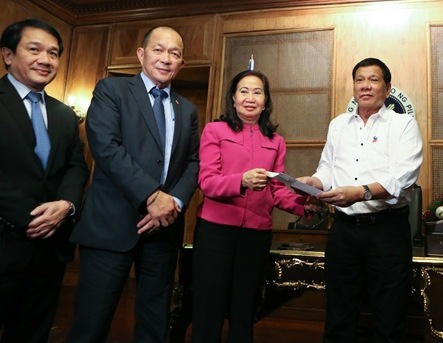Philippines Gaming Regulator Announces $500 Million Integrated Casino Resort in Cebu
Posted on: March 21, 2017, 02:00h.
Last updated on: March 21, 2017, 11:43h.

Philippines gaming regulator PAGCOR has approved a $500 million casino resort in the central island of Cebu. When the project is completed, it will mark the country’s first integrated gambling destination outside of the Manila capital.
PAGCOR (Philippine Amusement and Gaming Corporation) has been directed by President Rodrigo Duterte to grow gaming revenues and make the country a more attractive destination for both business and leisure travelers. The controversial leader has given the governmental agency a target deadline of 2020 to make the Philippines “the top gaming and entertainment destination in the ASEAN (Association of Southeast Asian Nations).”
In addition to regulating bingo parlors and privately owned casinos, PAGCOR operates its own resort casinos in Manila and VIP slot clubs in major cities. The agency is the largest contributor of money to the government behind only the bureaus of revenue and customs.
“Cebu is the second largest metropolis in our country,” PAGCOR Chairwoman Andrea Domingo said of the resort’s authorization. “There are cities there near the airport where the local governments welcome casinos.”
Former PAGCOR officials are currently under investigation by the country’s Department of Justice. Earlier this month, Justice Secretary Vitaliano Aguirre confirmed he had received alleged evidence of ex-PAGCOR executives engaging in bribery and other unlawful practices.
Two Better Than One
An unidentified Filipino-owned company is behind the $500 million casino in Cebu. But the group could soon get company in expanding resort-style gaming outside of Manila.
PAGCOR has also received a $300 million bid to build a resort in Mandaue City, a highly urbanized area in Cebu. That proposal comes from a Hong-Kong based firm according to Reuters. Though the Philippines hasn’t exactly been cordial to Chinese businesses in the past, Duterte has altered relations by taking a China over the US approach.
To succeed in making the Philippines a gaming and entertainment destination, PAGCOR is expected to license additional casino resort projects outside of Manila. But for the capital, the regulatory group says new licenses will be suspended for the next five years to prevent over-saturation.
Duterte Policy
Duterte’s main objective is to rid his country of corruption and illegal narcotics. He’s taken a no-holds-barred approach, and his “shoot first, ask questions later” legal directive has landed him in hot water with the United Nations.
Though been accused by foreign leaders of violating human rights for refusing to give legal due process to suspected drug traffickers, Duterte says he’s on a moral crusade. But when it comes to gambling, the president is willing to allow his citizens to play until their hearts are content.
His reign began by forcing PhilWeb’s eGaming cafes online, but Duterte later decided to reap the financial rewards of expanded gambling.
“I was mad because even the youth are gambling and there was no way of collecting the proper taxes,” Duterte said last summer. “Pay the correct taxes, gamble until you die. I do not really care.”
The Philippines estimates its gambling will generate up to $3.2 billion in 2017. Mass market tables and electronic gaming and slot machine revenue is currently taxed at 15 percent, but the country is considering ending a tax break for operators and restoring the rate to the original 25 percent.
No comments yet